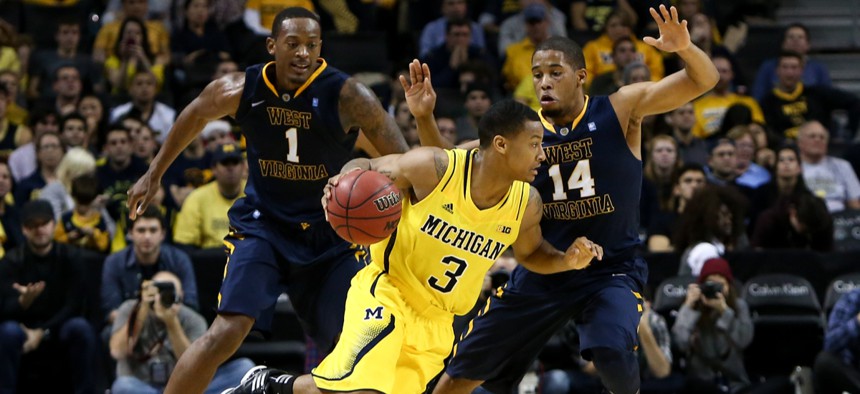The Debate Around Whether College Athletes Should Be Paid is Heating Up

The University of Michigan basketball team faces off against West Virginia University. Shutterstock
Michigan’s state legislature this week became the sixth state to pass a bill that would open the door for college athletes to get paid for endorsements.
Whether or not college athletes deserve to be compensated for their talents and efforts on the playing field is getting renewed attention.
Michigan on Wednesday became the sixth state to pass legislation that would allow college athletes to seek paid endorsements. The same day, the Supreme Court announced it would take up a case on the rules limiting athlete compensation, and the next day, two Democratic U.S. senators introduced a bill that would offer a wide range of rights to college athletes looking to be paid.
The Michigan legislature passed two bills that would give college athletes the right to earn money from the use of their name, image, and likeness, known as “NIL.” As the law currently stands, a university or an athletic conference can revoke a student athlete’s scholarship if they enter into an endorsement or sponsorship deal. One bill passed by the legislature grants athletes the right to enter deals without punishment—as long as they don’t take a deal that conflicts with an existing university sponsorship arrangement—while the other makes it legal for agents to work with student athletes.
Both bills received broad bipartisan support and passed without debate in the state Senate. State Rep. Brandt Iden, the Republican who sponsored the measures, is a former college athlete himself, playing tennis at Kalamazoo College. “This long-overdue reform will ensure they have the ability to go out and promote themselves—using their likeness or image—to make a few extra dollars, just like their classmates are allowed to do,” Iden said in May when the legislation passed the House.
The two pieces of legislation now head to Gov. Gretchen Whitmer, who has not said whether she’ll sign them. If they do become law, athletes could start entering contracts in 2023, in line with the date set by California, which last year became the first state to pass legislation allowing college athletes to be paid. The other states that have passed NIL laws are Florida, Colorado, Nebraska, and New Jersey.
In recent years, there’s been a growing desire—especially among state legislators—to ensure that college athletes are fairly compensated. Lawmakers in more than two dozen states have introduced legislation, ranging from NIL proposals, which are relatively common, to proposals that would require schools to pay students for their involvement in athletic programs. Proponents of these laws say that a system in which colleges and athletic conferences make billions of dollars in revenue each year while 85% of college athletes live below the federal poverty line is fundamentally unfair.
Opponents—most prominent among them the National Collegiate Athletic Association and major college sports conferences—say that student athletes are still students, and shouldn’t be treated like professional athletes. The NCAA is set to vote in January on revisions to their NIL policies, hoping to preempt the changes that are coming in July, when Florida’s legislation will be the first to go into effect. At that point, if the organization doesn’t act, students in the state would be operating by a different set of rules than those in the rest of the country.
On the same day Michigan lawmakers approved their bill, the Supreme Court announced it would also get involved in the debate. The justices agreed to review a petition brought by the NCAA defending the organization’s compensation restrictions on college athletes. Earlier this year, the 9th U.S. Circuit Court of Appeals ruled the NCAA’s policies restricting athletes’ ability to accept education-related benefits like postgraduate scholarships and computers were anticompetitive and violated federal antitrust laws. That decision, the NCAA wrote in its petition to the Supreme Court, “will fundamentally transform the century-old institution of NCAA sports, blurring the traditional line between college and professional athletes.”
The athletes in the case urged the high court to stay out of the matter, saying it was an issue for legislatures, not the judiciary. “Congress and many state legislatures have either adopted or are now considering proposals to require the NCAA and its members to roll back their restrictions on athlete compensation, recognizing the profound inequity of a system that enables conference executives, athletic directors, coaches, schools, television networks, and a host of others to make billions of dollars on the backs of young, often underprivileged players,” the players wrote.
U.S. Sens. Cory Booker and Richard Blumenthal on Thursday introduced the latest federal bill focused on college athletics, the 61-page “College Athletes Bill of Rights.” Booker, who played college football at Stanford University, said “this issue is personal” and that “the time has come for change.”
The legislation is much more far-reaching than any measure on the topic previously introduced at the federal or state level. It has a standard NIL provision that would override state laws and any changes the NCAA makes in January—but it would also create new health and safety standards for athletes, require colleges to provide lifetime scholarships to ensure athletes can get degrees, increase financial support for sport-related injuries, and create a president-appointed commission to enforce the new rules.
The senators defended the necessity of one of the most ambitious features of the bill—a requirement that schools share 50% of their profits from revenue-generating sports like football and basketball with athletes. They estimated that this could mean payments up to
$173,000 a year to football players. “The literal blood, sweat, and tears of student athletes fuels a $14 billion industry,” said Blumenthal. “Reforming this system is about basic justice: racial justice, economic justice, and health care justice.”
Emma Coleman is the assistant editor for Route Fifty.
NEXT STORY: COVID-19 Eased Drug Treatment Rules—And That Saved Lives






